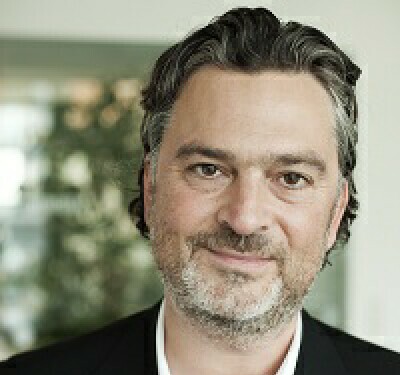Cannes Conversations: Stephan Beringer of Publicis’ VivaKi

This is the second in a series of “Cannes Conversations” on advertising automation with leading buyers and sellers. The conversations include all of the major ad holding companies and media owners such as Guardian, News Corp, Triad Retail Media and Turner Broadcasting.
The “Cannes Conversations” will continue at two events at Cannes Lions Festival hosted by Rubicon Project: The 2nd Annual Agency Trading Desk Panel on Le Rooftop on Tuesday, June 17, 2014 at 6:00-10:00 pm and the 1st Annual Publisher Automation Panel on the Rubicon Project Yacht (the Antisan) Wednesday, June 18, 2014 at 6:00-10:00 pm. Guests must RSVP here.
Your Name: Stephan Beringer
Your Company: VivaKi
Your Title: Chief Growth Officer and Global President of Audience On Demand (AOD)
SEARS: What’s your favorite candy bar?
BERINGER: Snickers
SEARS: Today on average globally --out of each $1.00 spent on media (all media, not just digital) by one of your advertisers --how much today is spent on automated or programmatic channels?
BERINGER: On average, we saw $0.06 of every $1.00 spent on automated or programmatic channels in the U.S. in 2012; today, that number is $0.08; and by 2016, we could see that number increasing to somewhere around $0.14. While these numbers are U.S.-only, we feel they reflect the larger, global picture given that approximately 70 percent of spend originates in advanced ad markets where programmatic and RTB exist, the vast majority of which operate in a similar capacity to the U.S. I'm proud to say that we feel we are performing above the market, something we attribute to the launch of Audience On Demand (AOD) in 2008 -- at a time when programmatic was still in its infancy -- and Publicis Groupe's strong emphasis on and commitment to digital.
SEARS: What was this number in 2012?
BERINGER: $0.06
SEARS: What will this number be in 2016?
BERINGER: $0.14
SEARS: Will a shift in agency compensation from percentage of spend and FTE models to pay-for-performance (aligning business outcomes with the advertiser) accelerate advertising automation, yes or no?
BERINGER: Pay-for-performance is a traditional model ad networks use to capture share, but our industry should really be trying to move away from percent of media and think about other models such as a subscription base to licensed technology. Performance metrics could be key, but as more branding dollars shift over I think we’ll start to see other metrics, such as the cost-per-viewable impression, cost-per-targeted audiences, etc. Percent of media has historically been an industry benchmark, but we need to move to newer and more sophisticated models.
SEARS: What is the mission statement of VivaKi AOD?
BERINGER: AOD was built exclusively for Publicis Groupe agencies and their clients. Created in 2008, our sole purpose has been to help marketers regain control over their brands and messaging in a fragmented ecosystem. We exist to connect them to their most important asset: their consumer. We help them identify, locate and scale their most valuable audiences … across channels and at the highest moment of receptivity.
SEARS: Please tell us:
SEARS: How many employees are there in your global organization?
BERINGER:433
SEARS: What countries have you entered/will you be entering in 2014?
BERINGER: Israel recently became the 43rd market to go live with AOD, just last month.
SEARS: What are VivaKi AOD’s three biggest global initiatives in 2014?
BERINGER:
1: We are passionately pursuing viewability and quality this year and are off to a great start. We are working with partners like comScore, Google, Integral Ad Science and Vindico to solve for better viewability metrics and methodologies in display and video.
2: We are also in the process of launching a set of metrics that will help our clients assess viewability, page content quality and historical performance.
3: Finally, we are evolving our VivaKi Verified process to guarantee these attributes.
SEARS: By 2016, what percentage of your holding company’s global media spend will be programmatic?
BERINGER: We think upwards of 40% of Groupe digital business to be bought programmatically with a chance of significantly higher share as the marketers continue to learn and understand that AOD can help them navigate and avoid the world of fraud, non-viewable ads, non-verifiable audience, etc, that has been pervasive in the programmatic marketplace to date. AOD has been a key leader in the efforts to drive a transparent programmatic marketplace. As more marketers realize that through AOD they can benefit from the efficiencies of programmatic while also avoiding the fraud from the “black box” offerings in the market we do expect the shift to accelerate and expect much higher shift moving in to 2015.
SEARS: What is your trading desk doing to encourage media owners to more aggressively adopt direct order automation?
BERINGER: Overall, I don’t think that every media owner should just automatically shift to direct automation. It should be part of a portfolio approach with RTB and have things like audience strategy for all data, as well as optimization efficiencies to account for things like frequency management to reach client objectives. We should also be negotiating this across a larger group vs. individual advertisers, as it’s more cost effective.
SEARS: What is your trading desk doing to encourage advertisers to more aggressively adopt direct order automation?
BERINGER:
1: Educating agency client service teams on the benefits of automation
2: Educating agency clients on the benefits of automation
BERINGER: In addition to the above, we are coming up with deals in the private marketplace. The answer isn’t really to shift everything that’s a direct buy to private marketplace. There are a lot of tools and technology in place to execute direct deal automated buys, but truthfully they are not where they need to be to do this efficiently or at scale.
SEARS: Why is direct deal automation so important? Is it important?
BERINGER: Direct deal automation will allow buyers and sellers to transparently transact and provide access to inventory that is not available in the open exchanges. It may include contextually relevant inventory, high impact units or other premium inventory. It also allows for a more holistic data strategy. Through a direct deal in a DSP there could be continuity among first and third party data strategies. There are also advantages like global frequency management. Currently the “automation” aspect isn’t operationally efficient. The negotiation and RFP process is still traditional in many aspects and technology needs to iterate quickly to efficiently scale direct deals.
SEARS: What is your guess? What percentage of CROs at top comScore publishers compensate their sellers equally for media that is hand-sold vs. sold via an automated channel (either orders or auction)?
BERINGER: It is too difficult to pinpoint, but historically alignment on bonuses has taken longer to be organized around programmatic and people are often not incentivized in the same way. However, it is changing fast with companies such as Google and Microsoft not differentiating between the two.
SEARS: What countries globally are the leaders and laggards in programmatic?
BERINGER: The focus on programmatic / addressable media across the globe is amazing. There certainly are markets today that are laggards more so because the ad tech infrastructure / standards just aren’t in place, such as China, parts of Southeast Asia, and other markets where digital advertising is just beginning to take hold. However, across Europe, Australia, Russia, parts of the Middle East -- the strategy is off and running, perhaps even in ways beyond what the US is doing overall, though the US is still years ahead on targeting / data capabilities.
Tell us a bit more about you:
SEARS: Who was one of your first mentors as a child?
BERINGER: We moved from country to country when I was a child, therefore continuity in mentorship was given to me only by my family, especially my father who was a UN diplomat. He always gave me some good advice.
SEARS: What’s your favorite movie?
BERINGER: I have no one favorite…
SEARS: Money is not a concern. You no longer work in advertising or technology. What would you choose to do for work?
BERINGER: I would work in advertising and technology. This is the most exciting time to be in the industry!
SEARS: What is your favorite restaurant in the world?
BERINGER: I have no one favorite…
Thanks Stephan!
The opinions and points of view expressed in this commentary are exclusively the views of the author and do not necessarily represent the views of MediaBizBloggers.com management or associated bloggers. MediaBizBloggers is an open thought leadership platform and readers may share their comments and opinions in response to all commentaries.

